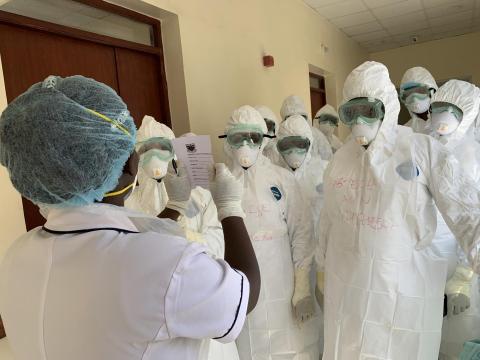
Despite falling in the high risk category, health authorities in the country have not made Personal Protective Equipment available to maternal wards in hospitals.
As Nigeria's fragile healthcare system struggles to cope with the Coronavirus outbreak, nurses and midwives have cried out over the lack of Personal Protective Equipment, which is essential if they must be protect from the virus.
Despite falling in the high risk category, health authorities in the country have not made Personal Protective Equipment available to maternal wards in hospitals.
A registered nurse/midwife, who works with a government-owned hospital in Ondo State, told SaharaReporters that nurses and midwives have been left with no choice than to ask pregnant women to buy PPEs like hand gloves, face masks and hand sanitizers before they are being attended to.

"We don't have any PPE and that's the truth. Even ordinary sanitizer, we don't have, it's as bad as that. I don't have anything to assure me of my safety, so I don't feel safe.
“The only safety I have now is God. And that is what is destroying this country, we always trust God for things that we should do for ourselves," she said.
The source lamented the cost burden on patients already vulnerable in their condition.
"They keep reassuring us. The other day, they produced fabric face masks but this should not be the type that is made available to health workers. We should at least get surgical masks even if we cannot afford the N95 mask because of the cost as a country but even the surgical mask is not available.
"Because of the peculiarity of my department, people cannot stay home in their conditions but so far, the hospital is not making provision for PPE. To ensure my safety, I require the patient to make gloves available for me. This is another cost burden on the patient.
"I get my own mask personally and so do other midwives around me."
She added that some hospitals had recalled staff in states with high COVID-19 cases to resume work without the recommended 14-day self-isolation period.
"We are worried that there are not enough test centres and test kits for COVID-19.
“At least for the emergency departments, there should be rapid testing but this is not the situation on ground. There is information that senior department heads got some PPEs but they are hoarding it.
"Some people who travelled outside Ondo State before COVID-19 where asked to return from Lagos and Osun to resume at work. The hospital management refused to allow them self-isolate before attending to patients. These are people who came in through public transport from Lagos," she added.
A handful of other nurses and midwives also told SaharaReporters that they have now been forced to have pregnant women provide protective gears for them to use before attending to them over fear of contracting the virus.
In Lagos, the epicentre of Coronavirus in Nigeria, a pregnant woman, Kelechi Ukatu, told SaharaReporters on Wednesday that she had been unable to access healthcare during the lockdown because of unavailability of doctors.
"I can't access healthcare during the lockdown, we could not go to the hospitals and even the few times that we went to the hospitals, the doctors were not around.
"One of the days I went to the hospital, we had to wait. Antenatals are usually by 9:00am but we had to wait until about 1 to 2pm before the doctors came around. The whole place was locked up.
"We couldn't get anything to eat before leaving the house by 9:00am and even in the hospital we had to wait for so long, so everybody was hungry, people stopped coming.
"At some point, I also had to stop going for ante-natal because there was no transportation system. We had to walk long distances and wait for the doctors to show up and even when they showed up, they didn't speak to us for a period of time.
"They write drugs for us but we could not access their pharmaceutical centres because they are also locked.
“There was a day I went and a sick person was brought in but wasn't allowed into the place we were because of the fear of COVID-19.
“He was looking suspicious and he was coughing, so everyone was scared. They had to lock up where we the pregnant women were to be able to attend to the patient," she said.